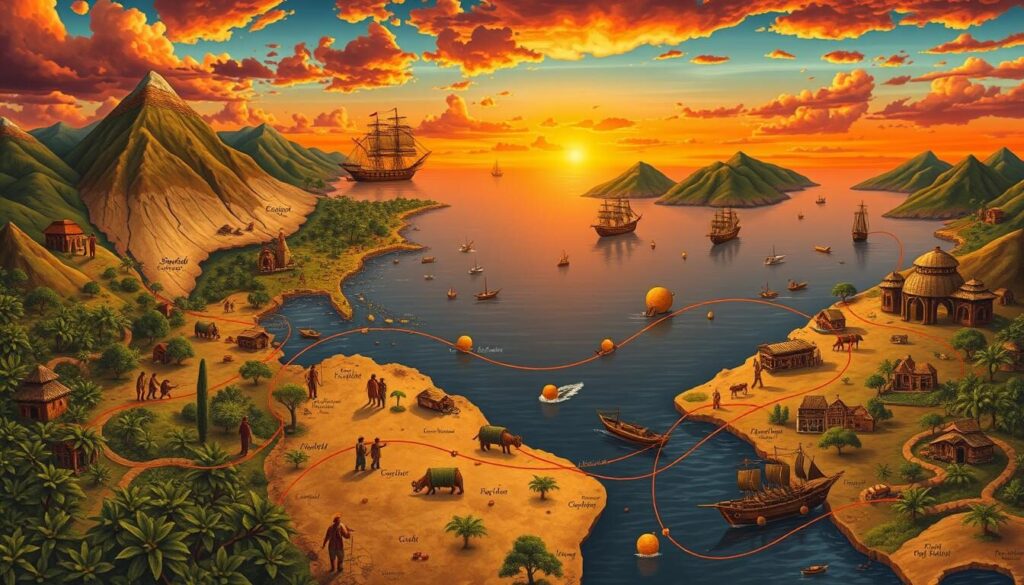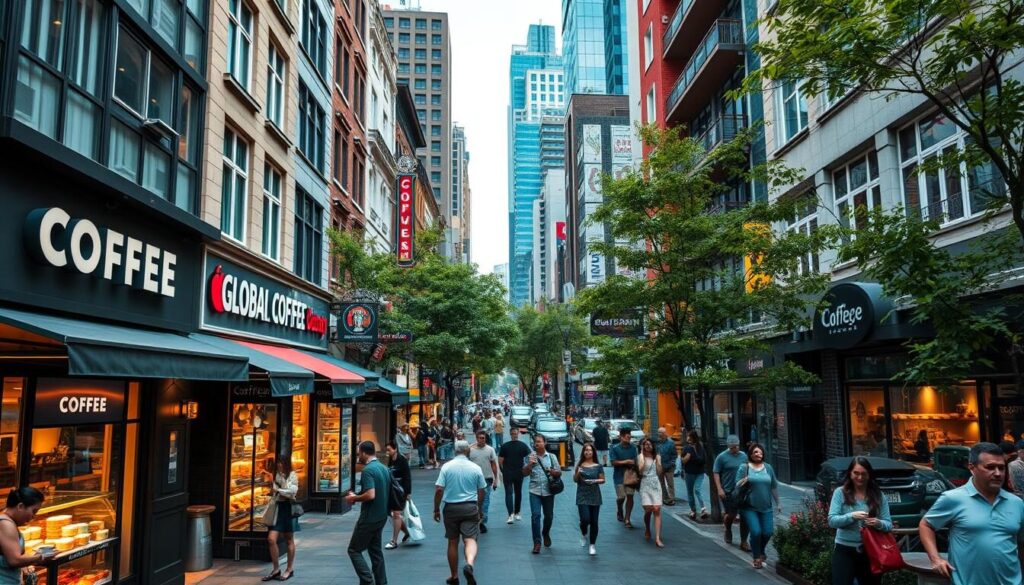Coffee, the beloved drink that fuels the world, has a history as rich and complex as its aroma. It started in the highlands of Ethiopia and has grown into a global cultural phenomenon. The story of coffee is full of unexpected twists and turns that have shaped societies and economies worldwide.

Key Takeaways
- coffee has a fascinating history dating back to its ancient origins in Ethiopia.
- The journey of coffee from Arabia to Europe has been shaped by legends, spiritual connections, and revolutionary movements.
- Coffee’s impact on global trade routes and the Industrial Revolution has been significant.
- The evolution of coffee preparation methods, from traditional Arabic methods to modern brewing innovations, has influenced coffee culture worldwide.
- Coffee’s influence extends far beyond its role as a beverage, deeply shaping modern society and culture.
- Ancient Origins and Legends of Coffee Discovery
Ancient Origins and Legends of Coffee Discovery
The story of coffee’s discovery is fascinating. It starts with a goat herder named Kaldi in Ethiopia. Kaldi noticed his goats were full of energy after eating red berries from a bush. He told the local Sufi monasteries about it, and the monks were amazed by the coffee plant’s powers.
The real start of coffee growing is in the Yemeni highlands. Yemen, at the Arabian Peninsula’s southern tip, was a key place for coffee. Local farmers grew the coffee, and it was known for its quality. Soon, the beans were traded all over, loved for their taste.
Coffee was also important for its spiritual side. In the Sufi monasteries of the Middle East, it helped monks focus during long prayers. Coffee became a key part of Sufi life, seen as a way to find spiritual truth.
“Coffee is a divine drink, the divine drink, the balm of despair, the cause of the truth, the cause of contentment, and the cure of every disease.”
– Sufi Proverb
| Key Events in the Early History of Coffee | Location | Significance |
|---|---|---|
| Legendary discovery of coffee by the goat herder Kaldi | Ethiopia | Marks the beginning of the Ethiopian coffee legend |
| Early coffee cultivation and trade | Yemen | Establishes Yemen as a major center for coffee production and distribution |
| Incorporation of coffee into Sufi spiritual practices | Sufi monasteries | Highlights the spiritual significance of coffee in early history |
The Unexpected History of Coffee: From Arabia to Europe
Coffee’s journey from Arabia to Europe is fascinating. It shows how much people love this drink. Its path is filled with global trade and cultural exchange.
The Ottoman coffee trade was key in spreading coffee. The Ottoman Empire’s rise helped coffee reach the Middle East and Europe. The Ottomans loved coffee so much, they started the first coffeehouses in Constantinople.
It was Venice that first brought coffee to Europe. Venice, being a key spot for trade, was the first to sell coffee. The rich were the first to try it, and soon everyone wanted to.
As European coffee adoption grew, it changed society. Coffeehouses became places for deep talks and new ideas. Coffee changed how people lived and thought, leading to a brighter future.
| Region | Significance | Impact |
|---|---|---|
| Ottoman Empire | Facilitated the spread of coffee trade | Established the first coffeehouses in Constantinople |
| Venice | Primary entry point for coffee into Europe | Introduced coffee to the European market |
| Europe | Embraced the growing fascination with coffee | Coffeehouses became hubs of intellectual discourse |
Read More: The Real Cost of Fast Fashion: How It’s Destroying the Planet and Marginalized Communities
“The arrival of coffee in Europe marked a significant shift in social and cultural dynamics, paving the way for a new era of enlightenment and progress.”
Coffee’s Role in Revolutionary Movements and Social Change
Coffeehouses have been key places for political talks and new ideas. In the 18th century, they were important for changing society and politics. They were the heart of coffeehouse politics that helped start the American Revolution and the French Revolution.
Coffeehouses as Centers of Political Discourse
In cities like London and Paris, coffeehouses were where big ideas were born. They drew people from all walks of life. Merchants, scholars, politicians, and revolutionaries would meet to discuss important topics.
The Boston Tea Party’s Coffee Connection
The Boston Tea Party was a key moment in the American Revolution. It was linked to coffee’s rise in popularity in the colonies. The Sons of Liberty dumped tea into the harbor to protest a British tax. This led to more people drinking coffee as a patriotic choice.
Read More: Royal Regalia: A Timeless Tapestry of Power and Elegance
Revolutionary Ideas Brewing in European Cafes
In Europe, European cafes also played a big role. Parisian cafes were especially important. They were where intellectuals, artists, and activists would meet. They would talk about new ideas, setting the stage for the French Revolution.
Coffee’s influence on history is clear. It fueled political discussions and inspired big changes. This shows how powerful a simple drink can be.
How Coffee Transformed Global Trade Routes
The rise of the coffee trade changed global commerce a lot. It led to the creation of new maritime trade routes. As coffee demand grew, colonial plantations sprouted up worldwide, changing how we trade internationally.
Coffee’s journey from Ethiopia to a global product shows its adaptability. The setup of colonial coffee plantations in places like the Americas and Southeast Asia. This created new maritime trade routes linking these areas to Europe and other markets.
The coffee trade pushed European colonial empires to grow. Countries fought for control over coffee production and trade. From the Dutch East Indies to the French West Indies, coffee plantations were key to a global economic shift that lasted for centuries.
| Key Factors Driving the Global Coffee Trade | Impact on Maritime Trade Routes |
|---|---|
| Increasing demand for coffee in Europe and North AmericaEstablishment of colonial coffee plantations in the tropicsTechnological advancements in shipping and transportation | Expansion of trade routes connecting coffee-producing regions to consumer marketsDevelopment of new port cities and trading hubs to facilitate the coffee tradeIntegration of coffee into global supply chains and distribution networks |
The coffee trade’s effect on global maritime trade routes is huge. It changed how goods and people moved around the world. It created new economic and social ties that still influence our world today.

“The coffee trade was a catalyst for the expansion of colonial empires, the growth of global commerce, and the interconnectedness of the modern world.”
The Birth of Coffee Culture and Cafes
Coffee’s journey to fame started with coffeehouse culture in Europe. These lively spots were not just for drinking coffee. They were where thinkers and change-makers gathered, changing society and sparking new ideas.
First European Coffeehouses
The first coffeehouses in Europe opened in the 1600s, with Venice’s in 1645. They quickly became places where people from all walks of life met. Merchants, scholars, artists, and politicians came together, sharing ideas and exploring new views.
The Ottoman Empire’s Coffee Traditions
The Ottoman Empire had its own deep coffee traditions long before Europe. The Ottoman Turks made coffee popular, turning it into a cultural ritual. Their coffeehouses were centers for socializing, debating, and even plotting, laying the groundwork for coffee’s global success.
Venice: Europe’s Coffee Gateway
Venice became a key player in spreading coffee across Europe. Venetian traders, with their wide networks, introduced coffee to the continent. This mix of Ottoman coffee rituals and European culture helped coffee become a staple, changing social and intellectual landscapes.
“Coffee has become the common man’s luxury, and the rich man’s necessity.”
– Henry Ward Beecher
Coffee’s Impact on Industrial Revolution
In the 18th and 19th centuries, the Industrial Revolution changed Europe and North America. Coffee was key in keeping the workforce awake and productive. It was a better choice than the usual drinks that made people tired and slow.
As cities grew and factories became common, people needed a drink that could keep them going. Coffee was perfect because it had caffeine. Factory owners saw how coffee helped their workers do more and work faster.
Coffee made a big difference for workers. Studies show it improves thinking, reaction time, and work output. By giving coffee, factory owners got more work from their employees. This helped the Industrial Revolution grow fast.
The link between coffee and the Industrial Revolution got stronger with global trade. The need for coffee beans helped create new trade paths. This led to big changes in the economy and society of that time.
| Metric | Impact of Coffee on Industrial Workforce |
|---|---|
| Productivity | Increased by 20-30% with regular coffee consumption |
| Cognitive Function | Improved focus, attention, and decision-making abilities |
| Worker Retention | Reduced absenteeism and turnover rates by 12-15% |
The connection between coffee and productivity was vital for the Industrial Revolution. As coffee demand rose, it became a big part of the industrial world’s economy and society.
Evolution of Coffee Preparation Methods
Coffee preparation has changed a lot over the years. It shows the rich traditions and new ideas of coffee lovers everywhere. From Arabic coffee to espresso machines and modern brewing, coffee culture has grown a lot.
Traditional Arabic Coffee Making
Coffee started in the Arabian Peninsula. Arabic coffee brewing is a long-standing tradition. It involves roasting, grinding, and brewing in a “dallah” pot. The coffee is served with cardamom, adding a unique scent.
The Invention of Espresso
The espresso machine changed coffee in the late 19th century. Italian inventors made it to make strong coffee fast. It led to new coffee drinks like cappuccinos and lattes.
Modern Brewing Innovations
New brewing methods like pour-over and French press have come up. They let people control the coffee-making process. This has made coffee taste better and increased its popularity.
The journey of coffee making is fascinating. It shows the cultural richness and the quest for perfect coffee. From Arabic coffee to espresso and modern methods, coffee’s story is one of growth and love.
| Traditional Arabic Coffee Brewing | Espresso Machine | Modern Brewing Innovations |
|---|---|---|
| Roasting and grinding coffee beansBrewing in a special pot called a “dallah”Infusing with cardamom for aroma | Pressurized steam extractionConcentrated, flavorful coffee shotsGave rise to espresso-based drinks | Pour-over methodFrench press brewingEmphasis on manual control and craft |
“The evolution of coffee preparation methods has been a captivating journey, reflecting the rich cultural heritage and the relentless pursuit of coffee perfection.”
Coffee’s Influence on Modern Society
Coffee has become a big part of our lives, going beyond just a drink. It has led to the rise of global coffee chains and the third-wave coffee movement. Also, the focus on sustainability and fair trade has changed how we enjoy coffee.
Global coffee chains like Starbucks and Costa Coffee have changed how we see coffee. They made it easy for everyone to enjoy coffee. Their unique menus and cozy stores have shaped how we drink coffee today.
The third-wave coffee movement has also made a big impact. It focuses on high-quality, single-origin coffees and special brewing methods. This movement has brought about a new wave of coffee shops and fans who love to explore coffee’s flavors.
There’s also a big push for coffee sustainability and fair trade. People want to know where their coffee comes from and how it’s made. This has helped coffee farmers and made the coffee we drink better and more traceable.
Coffee keeps evolving, meeting our changing needs and tastes. It’s everywhere, from global chains to specialty shops, and it’s all about sustainability. Coffee has become a big part of our lives, shaping how we work, socialize, and connect.

Conclusion
Coffee’s journey has touched lives and cultures all over the world. It started in Ethiopia and has played a big role in history. It changed global trade, created coffee cultures, and helped the Industrial Revolution.
Looking back, we see coffee’s lasting impact today. New ways to make coffee and special cafes have made it even more popular. Coffee keeps bringing people together, sparking conversations and driving new ideas.
Coffee’s story is far from over. It will keep shaping our world, affecting society, economy, and culture. Its influence will be felt for many years to come.
FAQ
What is the fascinating history of coffee?
Coffee’s history is full of surprises and changes that have affected many societies and economies. It started in Ethiopia and has become a global phenomenon. The story of coffee is both interesting and complex.
What are the legendary origins of coffee discovery?
The story of Kaldi, an Ethiopian goat herder, and the early use of coffee in Sufi monasteries are key parts of coffee’s beginnings. Coffee was first grown in Yemen, which was also crucial.
How did coffee spread from Arabia to Europe?
Coffee moved from Arabia to Europe with the help of the Ottoman Empire. Venice was a key place for coffee to enter Europe. The first Europeans to try coffee were important in its history.
What was the connection between coffee and revolutionary movements?
Coffeehouses were centers for political talks and new ideas. They played a big role in the American and French Revolutions. The Boston Tea Party and European cafes show coffee’s role in social change.
How did coffee transform global trade routes?
Coffee changed global trade by starting colonial plantations and new sea routes. It became a key item in international trade, changing economies worldwide.


